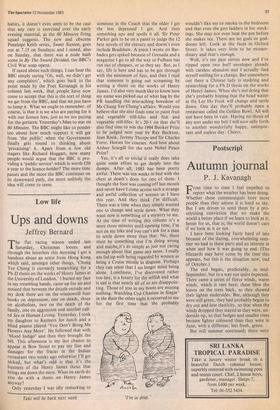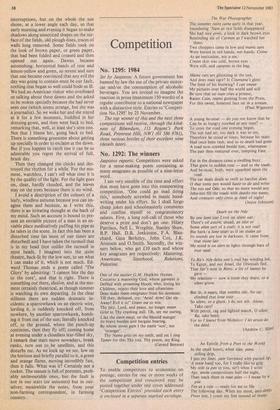Postseripl
Autumn journal
P. J. Kavanagh
From time to time I feel impelled to report what the weather has been doing. Whether these communiqués bore more people than they amuse it is hard to say. But I am driven to send them by a pro- selytising conviction that we make the world a better place if we learn to look at it; better for us, that is; the world doesn't care if we look at it or not.
I have been looking fairly hard of late because of the dazing, overwhelming sum- mer we had in these parts and an interest in when and how it was going to end. (The blizzards may have come by the time this appears, but this is the situation now, end of October.) The end began, predictably, in mid- September, but in a way not quite expected. There came a series of fierce winds, warm winds, which is rare here; these blew the leaves on the trees back, so they showed their lighter undersides. But, although they were still green, they had probably begun to dry out and lose elasticity, so that when the winds dropped they stayed as they were, un- derside up, so that hedges and smaller trees became lighter coloured than they were in June, with a different, less fresh, green.
But still summer continued; there were
interruptions, but on the whole the sun shone, at a lower angle each day, so that early morning and evening it began to make shadows along unnoticed shapes on the sur- face of the fields, old plough-lines, traces of walls long removed. Some fields took on the look of brown paper, or green paper, that had been folded and creased and then opened out again. Dawns became astonishing: horizontal bands of rose and lemon-yellow and green, so serene and sure that one became convinced that any evil the day was going to contain must be our fault, nothing that began so well could bode us ill. We had an American visitor who overheard us talking about these dawns and she asked to be woken specially because she had never seen one (which seems strange, but she was a journalist). So we woke her and she stared at it for a few moments, huddled in her dressing-gown, and then went back to bed, remarking that, well, at least she's seen one. Not that I blame her, going back to bed. There is something gruesome about getting up specially in order to exclaim at the dawn. But if you happen to catch one it can be so admirable you regret the arrival of full, brash day.
Then they changed the clocks and des- troyed the rhythm for a while. For the mo- ment, watchless, I can't tell what time it is by the quality of the light. For the light goes on, clear, hardly clouded, and the leaves stay on the trees because there is no wind.
I avoid a description of the colours of a leafy, windless autumn because you can im- agine them and because, as I write this, there is an irritating thought at the back of my mind. Such an account is bound to pre- sent an enviable picture of a man in an en- viable place meditatively puffing his pipe as he takes in the scene. In fact this has been a disturbed time (as most of our times are disturbed) and I have taken the turmoil that is in my head (not unlike the turmoil in most heads, I imagine) into the quiet theatre, back-lit by the low sun, to see what I can make of it, which is not much. Ed- ward Thomas ends a poem called 'The Glory' by admitting: 'I cannot bite the day to the core', and that is right. There is something out there, elusive, and at the mo- ment certainly theatrical, as though summer is watching its own departing. In the clear stillness there are sudden dramatic in- cidents: a sparrowhawk on an electric wire, lording it, is suddenly knocked off, from nowhere, by another sparrowhawk, bomb- ing it from out of the sun; literally knocked off, to the ground, where the punch-up continues, then they fly off; coming home at evening under a cloudless star-filled sky, I remark that stars move nowadays, break ranks, turn out to be satellites, and this disturbs me. As we look up we see, low on the horizon and briefly parallel to it, a green and orange flame, moving incredibly fast, then it falls. What was it? Certainly not a rocket. The season is full of portents, prob- ably unfavourable ones, but the fault is not in our stars (or autumns) but in our- selves; meanwhile the notes, from your non-farming correspondent, in farming country.















































 Previous page
Previous page